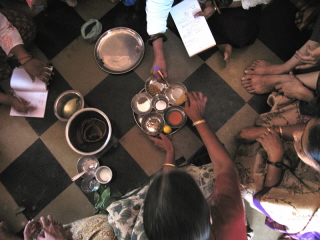Quilts and other
cloth-based narrative art are part of many cultures. Quilts serve as both personal and communal objects and are a form of artistic expression too. These are often
made by hand collaboratively using materials such as scraps of cloth.
When these scraps of cloth are put together, there is much more than gross geometrical patterns .... they tell a story about their creator, the historical and cultural context of their creation through the choices made in design, material and content.
In North karnataka In each house you will find women making quilts for
the monsoon season. After a tiring day's work,the women
settle down in the verandah to work on their quilts. An old sari is used as a backing for the
pattern created from pieces of used cloth. The colorful bits of cloth are often lovingly gathered from family and
friends over a period of time.The quilting practice also helps understand how women in villages / small towns always found use for scrap or the smallest of things. It is also interesting to observe how they find creative use for it :) To gift a quilt, sewn
with old clothes of the family, for the daughter who gets married, often
carries fond memories of the maternal home.
Nirmalakka from buDa folklore stitches quilts. Her needlecraft shows a remarkable expertise
and originality. She will be sharing the techniques and patterns involved in the
process of stitching a quilt. It is an opportunity to work under the guidance
of a traditional quilt maker.
The details are given
below. Do come along if you are interested and do pass it around as well.
Thanks
3 days Workshop on: The Art of Quilt making
Date: Jan26th to Jan28th
Time: 10am - 5pm
Venue: #117, Vakil Garden City, Near Talagattapura Police Station, Kanakpura Road, Bangalore
Contact: 08026968117
Email: folkloreindia@gmail.com
Pl Note: Participants will get to create a mini quilt and will learn traditional quilt making stitches.
I had the most fulfilling 3 days of my life attending the last
workshop. That mini quilt started off as our dining table centre piece and now
functions as Rahul's laptop coaster and doubles as a mousepad too! Nirmalakka
is a champ and Savita Uday's
commitment is inspiring.
Date: Jan26th to Jan28th
Time: 10am - 5pm
Venue: #117, Vakil Garden City, Near Talagattapura Police Station, Kanakpura Road, Bangalore
Contact: 08026968117
Email: folkloreindia@gmail.com
Pl Note: Participants will get to create a mini quilt and will learn traditional quilt making stitches.
Please write to us if you are interested for further details.
More links:
Participants write:
Carol Shatananda
Hey Savita,
:) Nice to see
that there is another workshop on! All the best.
Is Nirmala akka
doing it again? Please give her my love and tell her that I think of her with
much fondness. How are you doing?
I'm not sure if I
told you but we've moved to Toronto so I am going to miss this.
Well, I hope it
goes very well. And I hope this time the participants will do more of the
write-ups.
Love,
Carol































